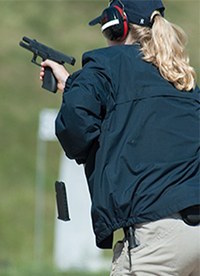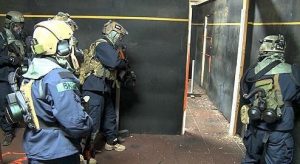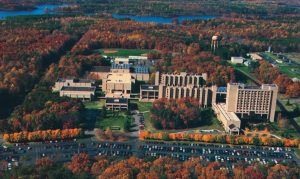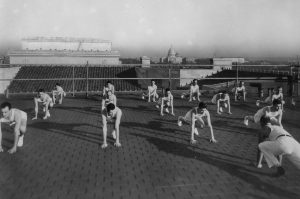KN, p. 220 “FBI Academy Training at Quantico”
Picture an FBI agent in your mind. Most of you will envision neatly dressed men or women, garbed in conservative dark suits, plain blouses, and shirts and ties. An alternate view might be that of the navy blue windbreaker with the foot high, yellow FBI lettering emblazoned on the back. Haircuts are conservative for both men and women. If not exactly a uniform, very close. So, if you like to wear purple shirts to work and dye your hair turquoise, the job of a Special Agent is not the perfect fit for you.
“What Does the FBI Do?” dealt with a bit of history – how/why the FBI came into being and what it is responsible for now.
“The Road to Quantico” dealt with entrance requirements for the FBI Academy at Quantico.
You’ve passed the preliminary tests, set your sights on a life in law enforcement serving in one of the most famous agencies in the world. You’ve competed against hundreds of thousands of other applicants, and feel more than ready to take on the Academy challenges. What’s next?
You will report to Quantico for 21 weeks of intensive training and will live in dormitory style accommodations during your stay. The Academy site is much like a college campus, in that it has classrooms, conference rooms, a library, a gym, a pool, and a dining hall. What sets it apart in structure is that it also has a firing range, a mock town, and a high-speed 1.1-mile oval road track.
Much of the Basic Field Training Course will take place in a classroom, while candidates study a curriculum that reflects the experiences most likely to be encountered in the field. Special Agent trainees and Intelligence Analyst trainees will work together to develop the skills to collect, share, and use the information available to investigate terrorists and dangerous criminals. If the trainees fall short of the FBI standards, they will be sent home.
Basic Field Training Course includes:
- Academics
- Case exercises
- Firearms training
- Operational skills
- Physical Fitness
Academics
Among other areas, the trainees study applications of the law, ethics, human behavior, report writing, intelligence techniques, and forensic science. Students learn how to manage and run a variety of investigations, including those dealing with counterterrorism, spies, weapons of mass destruction, and cyber crimes.
Case Exercises
At Quantico, case exercises are a method of presenting real-life situations to prepare the candidates for their future of working in the field. A typical exercise starts with a tip and ends in the arrests of the suspects. Hogan’s Alley is a mock town at the Academy where some of this action may take place. In some scenarios, candidates might get to try the case in a mock trial.
Firearms Training
It is assumed that at some point in their service, FBI Special Agents will have a deadly force encounter, so they must prepare for it. As of this writing (2018) the new agent trainees work with a Bureau-issued pistol, carbine, and shotgun. They focus on marksmanship, but also receive instruction on firearms safety and live fire situations.
Operational Skills
Acquiring information in the classroom is only part of the training at Quantico. The ability to apply that information to real-life circumstances is essential to the success of any operation. The candidates work on the basics of disarming and handcuffing suspects, searches, surveillance, and tactical driving.
At Hogan’s Alley, trainees practice different arrest options, as well as street survival techniques. Realistic drills might include how to handle a bank robbery or a kidnapping.
Physical Training
Aside from acquiring the basic knowledge needed to do the job successfully, the agents must be in top shape. To that end, even after passing the entrance level of fitness tests, fitness training continues and so does the testing. Nobody is likely gain any extra weight during the 21 weeks at the Academy, but they may acquire a few more muscles. They must continue to do well in the number of sit-ups in one minute, a timed 300-meter sprint, a significant number of push-ups (untimed), and a timed 1.5-mile run. See the “The Road to Quantico” for more fitness details.
Intelligence Analysts
The rise of terrorism and the shrinking global community has forced law enforcement agencies all over the world to evolve. The FBI Academy now offers more focused training for intelligence analysts, recognizing that more informed collection and analysis of certain data can help to eliminate threats against our country. Teaching tradecraft is an aspect of the training. These days, it’s standard practice for the Intelligence Analysts and the Special Agent candidates to work side-by-side in the classes, developing a collegial approach to solving cases.
Car Chases
TV and the movies show us enough car chases to imply that this is a part of the daily life of any and all law enforcement officers. While not exactly true that it happens to everyone and/or on a daily basis, the men and women that attend the Academy must know how to handle those rare occasions when it does.
For an FBI agent, real life might include high speeds and guns and terrorist activity. At the Tactical and Emergency Vehicle Operations Center (TEVOC), candidates, the DEA, and other government and military personnel are taught how to maneuver at high speed, how to spot threats with a second’s notice, and how to react effectively. Onsite is the oval road track and off road training is given as well.
Specialized Training
Many types of FBI and government personnel are sent to high-risk postings overseas and they might receive more specific training at TEVOC. Awareness of the risks and the sophistication of enemies here and abroad has caused an uptick in the need for curriculum that blends survival training and driving techniques in meaningful ways for many law enforcement groups.
Long after graduation, the Special Agents and the Intelligence Analysts will return to the Academy for fine-tuning and for courses that will keep them updated on the latest techniques and threats. Academy training is considered among the best in the world, so international groups and people in private security work have been trained here as well. In addition, other United States law enforcement groups have participated in training at Quantico as threat levels from all sides have ramped up.
*All photos from the FBI website.
KN, p. 220 “FBI Academy Training at Quantico” Read More »





